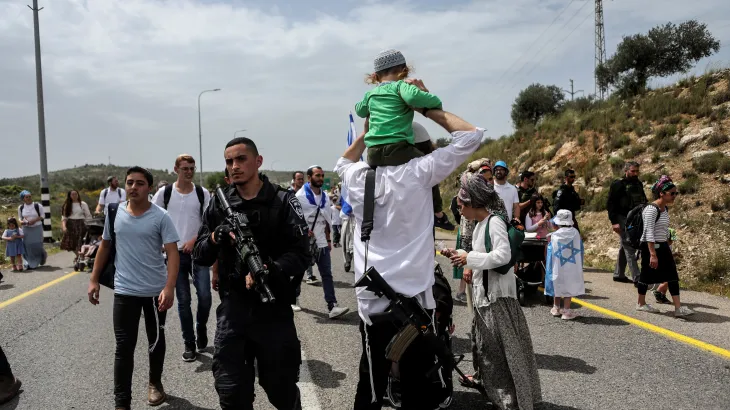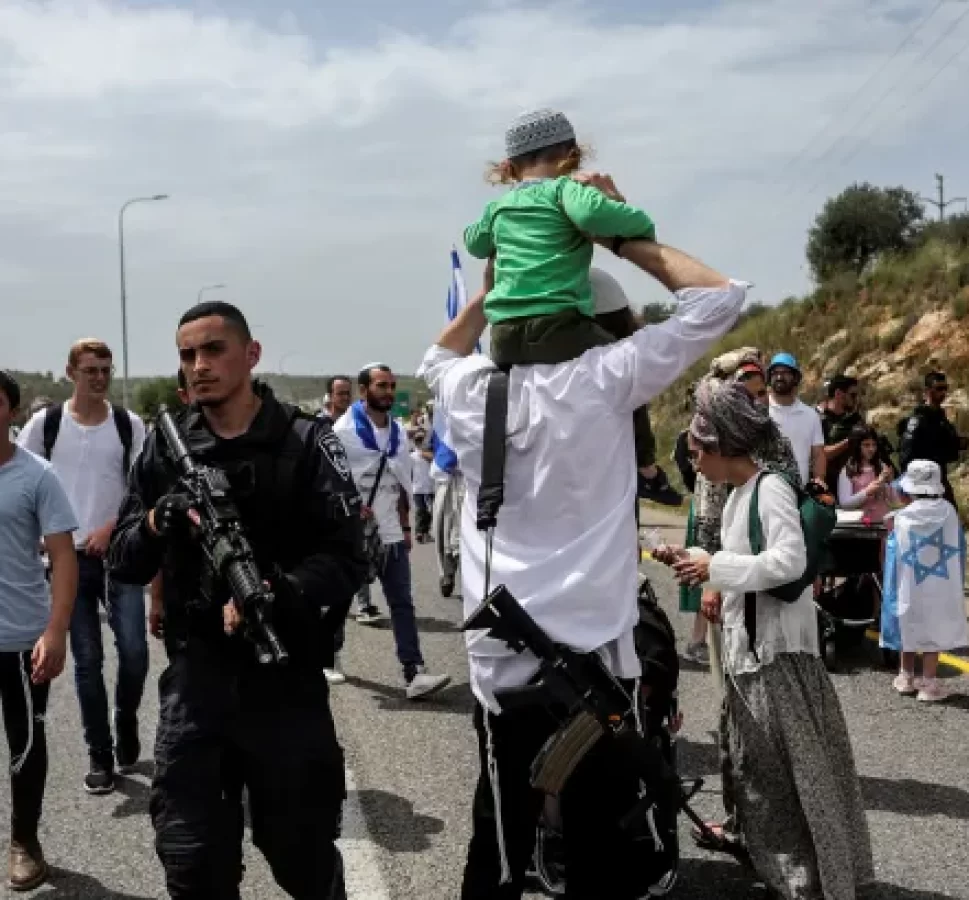
The Biden administration has focused its punishments on Israeli settlers, but Palestinians on the ground have seen little change.
Haitham Kaabna and his family were terrified when dozens of Israeli settlers stormed their village of Tajamaa al-Murajaat in the occupied West Bank on October 13.
The settlers, he says, were protected by the army and carried M16 assault rifles as they attacked farmers.
For two weeks, settlers destroyed olive trees, vandalised cars and stole cattle. The violence led to the forced displacement of some 200 Palestinian families from Tajamaa al-Murajaat, in the Jordan Valley.
Kaabna stayed, until settlers entered his home on October 26 and he felt he had to flee with his family to safety.
“Maybe 40 settlers came into our house and began beating up women and children. They also hit my brother and my son, who is only about two years old,” Kaabna told Al Jazeera.
Since October 7, Israeli settlers have attacked and expelled 20 Palestinian communities in the West Bank, according to Human Rights Watch (HRW).
The forced expulsions have flown under the radar due to Israel’s war on Gaza, ostensibly in retaliation for a Hamas-led surprise attack on southern Israel, which has killed more than 34,000 people and drawn accusations of genocide.
Attacks have escalated in recent weeks, despite moves by the United States government to sanction some settlers and cut military aid to an Israeli army unit implicated in grave human rights violations.
Neither move goes far enough to stop a state-backed effort to “ethnically cleanse” Palestinians from their villages, experts and activists told Al Jazeera.
“We are not just talking about attacks from fanatic settlers,” said Jamal Juma, a Palestinian activist in the occupied West Bank who monitors settler attacks.
“We’re talking about organised plans that have been pushed forward on the ground strongly and systematically by the Israeli government.”
Legitimising illegal settlements
Israel has expanded illegal settlements in the occupied West Bank despite signing the 1993 Oslo Accords, which initiated a peace process obliging Israel to freeze settlements to create a Palestinian state.
However, the US effectively approved of Israel’s settlement expansion when President Donald Trump’s administration declared them legitimate, contravening international law. Trump’s decision emboldened the Israeli government – and settlers – to step up the confiscation of Palestinian villages, according to Juma.
“The settler-colonial project was always there but it needed legitimisation and Trump legitimised Israel’s entire colonisation of historic Palestine,” he told Al Jazeera.
Under President Joe Biden, the US restored its former position by labelling Israeli settlements illegitimate in February, but only after Israel approved in the same month plans to build 3,300 new homes in illegal settlements.
The US is also expected to apply the Leahy Law, which prohibits US military aid from going to any foreign battalion implicated in human rights violations, to an Israeli army unit named Netzah Yehuda.
The unit is made up of ultra-Orthodox Israeli men and has committed grave crimes against Palestinians, human rights groups and monitors say.
Sarah Elaine Harrison, a former official in the US Department of Defense and an expert with the International Crisis Group, told Al Jazeera that the Leahy Law is not the equivalent of sanctions and that Israel can still buy weapons to give to Netzah Yehuda.
She added that there is no tracking system in place to monitor whether Netzah Yehuda will still be able to acquire US weapons via the annual military aid the US gives Israel.
“It’s complicated because Netzah Yehuda could be still carrying US firearms and we won’t know if they are part of the foreign military financing – the $3.3bn Israel receives from the US each year – or purchased with Israel’s money,” she told Al Jazeera.
Little accountability
Netzah Yehuda could be eligible to regain US military aid if Israel holds soldiers in the unit accountable for violating human rights.
However, Israeli officials have defended Netzah Yehuda and blasted the US for its move, raising doubts that Israel will begin disciplining its soldiers and commanders.
Benny Gantz, a minister in Israel’s war cabinet, tweeted that the brigade was “an inseparable part” of the Israeli army and that Israel has a “strong, independent judicial system” capable of dealing with alleged violations.
But according to the Israeli human rights group Yesh Din, only 2 percent of complaints made by Palestinians harmed by Israeli soldiers in 2019-2020 led to the prosecution of suspects.
“The pushback from Israel is that if you criticise one soldier then you undermine the whole apparatus and even the country itself,” Harrison told Al Jazeera.
The US has also sanctioned four settlers for their role in assaulting and intimidating Palestinians and Israeli activists. Rights groups welcomed the move, but have called for additional sanctions on Israeli officials that authorise illegal settlements. The US has ruled out that move, for now.
“There are no plans to target with sanctions Israeli government officials at this time,” White House national security spokesperson John Kirby told reporters in February.
Karim Ali*, a 26-year-old Palestinian activist, told Al Jazeera that two of the sanctioned settlers live in his area, near Hebron.
While they have stopped attacking Palestinians, Ali said other armed settlers are still vandalising his village by punching holes in water reservoirs or stealing livestock feed.
The settlers, Ali explained, are pressuring the roughly 100 Palestinian villagers to flee their land by sabotaging their livelihoods.
“About 90 percent of our fields – which are close to settler outposts – were not cultivated this year, so we are struggling to get food for our sheep. This is a community of shepherds that have no other way to survive. They have no other economic infrastructure,” he told Al Jazeera.
Cover-up
While the Leahy Law and sanctions have not mitigated human rights violations in the West Bank, Palestinians say settlers are protecting their identities to evade possible consequences for committing abuses.
Ali said his uncle was attacked for photographing a vehicle carrying armed settlers. The settlers beat his uncle, zip-tied his hands and threw him in the back of their truck. They then took him to their settlement and told him to delete the photos from his phone.
“The settler even took a knife and stabbed the camera lens on [my uncle’s] phone and said: ‘This is what will happen to anybody that raises a phone in front of us again,’” Ali told Al Jazeera.
“[The settler] said: ‘This time I’ll let you go back home. But not next time.’”
Kaabna, who is now living on a deserted strip of land with his family, said settlers confiscated everyone’s phone when they raided his house.
“They don’t want us to photograph or record their violence. They don’t want us taking any pictures,” he told Al Jazeera.
Kaabna and Ali stressed that US sanctions will not deter settlers from attacking Palestinian villages unless pressure is also applied to end Israel’s occupation.
“Any moves [taken] that show settlers that their crimes are being watched is something [useful] … but the sanctions are just bandaging a problem instead of facing it head-on,” said Ali.






